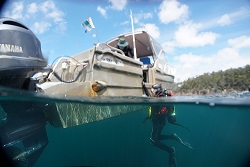
Scientists at IMAS will continue delivering vital fisheries and aquaculture research that informs the sustainable management of Tasmania’s marine resources after the University of Tasmania and Tasmanian Government renewed a long-standing partnership for another 10 years.
The Sustainable Marine Research Collaboration Agreement (SMRCA) between the University and Government, which is delivered by IMAS and the Department of Natural Resources and Environment Tasmania (NRE Tasmania), has been extended until 2032. The government will provide at least $26 million towards the SMRCA over 10 years.
The SMRCA allows IMAS, as part of the University, to provide NRE Tasmania with independent, world-class research on wild fisheries, aquaculture environments, aquaculture production, fish health, biosecurity and seafood safety, and human dimensions and modelling.
This includes providing advice on the status of marine resources and options for sustainable management based on thorough and collaborative research with government, industry, and the community. The research assists with government decisions that help our local fisheries and aquaculture industries and the marine environment that supports them.
The SMRCA partnership commenced when the University and the Tasmanian Government established the Tasmanian Aquaculture and Fisheries Institute (TAFI) in 1998, with the program renewed in 2010 after TAFI merged into IMAS. For the past 25 years, IMAS/TAFI has conducted most of the SMRCA’s research at the Taroona Marine Laboratories.
 |  |
|---|
“This partnership renewal will help us continue to deliver crucial fisheries and aquaculture research outputs for another 10 years,” said SMRCA Director, IMAS Professor Caleb Gardner.
“It will allow our team of researchers and PhD students to produce independent, world-class science that provides tangible benefits to the community. We have a proud history of creating social, economic and environmental benefits around Tasmania.
“Each year, our researchers determine the status and health of various marine species and associated ecosystems. This is needed to manage rock lobster, abalone and scalefish fisheries, the range-extending Longspined Sea Urchin, marine biotoxins and diseases in shellfish, salmonid farming, shellfish aquaculture, and socio-economic research.
“You can see the impacts of this research on many marine management decisions around Tasmania.”
 |  |
|---|---|
 |  |
The SMRCA is also overseen by an advisory committee that brings a diverse perspective on research priorities. Committee members also act as information agents to the wider community.
More information about the SMRCA is available here.
Images:
Published 1 March 2023